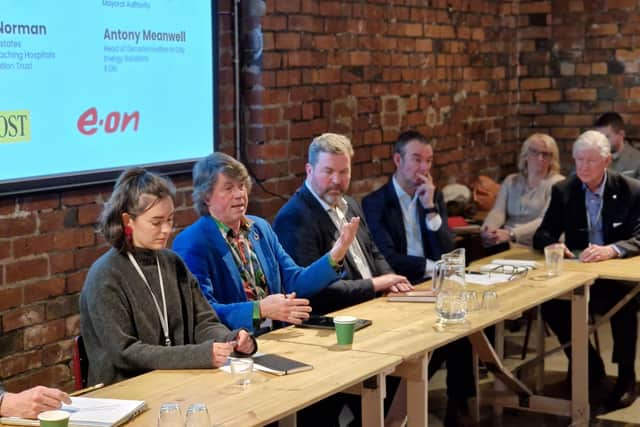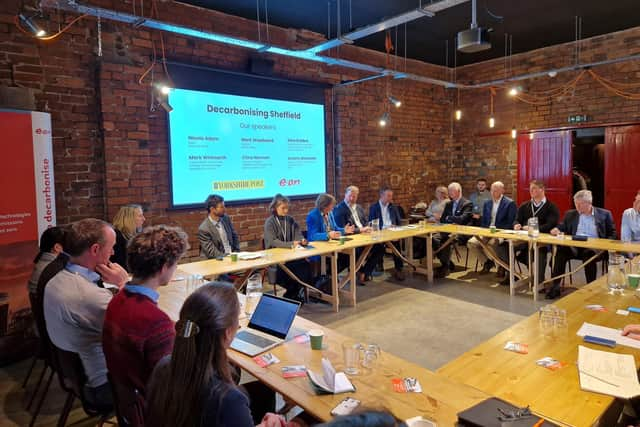Waste not want not: Expanded heat networks ‘could drive energy renaissance for Sheffield’
The ’heat zoning’ concept was outlined at a round-table discussion of business leaders from across South Yorkshire and would involve expanding existing heat networks in the city via new heat pipes, providing homes and businesses across the city with cost effective, low carbon heat.
Such a development could help the city cut emissions, reduce the environmental impact of connected businesses, create opportunities for jobs and skills and provide growth in local manufacturing and the local supply chain within the region.
Advertisement
Hide AdAdvertisement
Hide AdOne of the speakers at the round-table event was Antony Meanwell, Head of Heat Zoning at E.ON, which owns and operates a heat network in the Lower Don Valley, supplied from the Blackburn Meadows renewable energy plant.


He said: “Sheffield is perfectly positioned to access sources of what would otherwise be ‘waste’ heat – from industry, water treatment works, even old coal mines – and capture it for use as a more sustainable heat source for homes and businesses. Done properly, Sheffield could even become a net exporter of green skills and supply chain, whilst providing a more sustainable energy source that helps to bring manufacturing back to the city.”
“Heat networks are a vehicle not only for reducing carbon emissions, but potentially for bringing investment to Sheffield which could create jobs for local people and local businesses.”
The E.ON-sponsored event was chaired by National World’s Nicola Adams and attended by key stakeholders from business, Sheffield City Council, public sector and governing members, and was an opportunity to bring Sheffield businesses into the fold.
Advertisement
Hide AdAdvertisement
Hide AdThe event was attended by numerous local business leaders and opened with speeches from Sheffield City Council’s Sustainability and Climate Change Service Manager, Mark Whitworth; the Director of Nordic Energy, Mark Woodward; the Head of Growth and Skills Policy at the South Yorkshire Mayoral Combined Authority, Alice Rubbra; Sheffield Teaching Hospital’s Director of Estates, Chris Norman and Antony Meanwell from E.ON.


Mr Whitworth outlined the council’s vision for city wide decarbonisation and said that expanded heat networks could bring social and economic benefits to the wider Sheffield community.
One such benefit could be cleaner air quality, as mentioned by Mr Norman, who said energy efficiency improvements to Sheffield Teaching Hospital, alongside a possible connection to any extended district heating network would improve the comfort and wellbeing of visitors, staff and patients at the Northern General Hospital and the surrounding community.
“The technology we’re exploring is all tried and tested,” Mr Meanwell said. “There are similar established heat systems that we operate in Malmo in Sweden and Poland so this is not a new concept.”
Advertisement
Hide AdAdvertisement
Hide Ad“In the 1970s and 1980s we put gas pipes in the ground and gave people gas to heat their homes, but on the continent they put heat pipes in the ground.”


Any extension to existing networks would require the manufacture of new steel pipes, which could well be done in Sheffield, with similar national approaches providing a UK market for expert production in this sector, which would build on the city’s historic expertise and background.
Expanding heat networks to meet the new heat network zoning regulation that is being planned by the UK Government, will reduce our reliance on fossil fuels and could also stimulate a range of wider benefits people could see in their lives. Mr Meanwell spoke of improvements to cycling and walking
infrastructure amongst the many other benefits that could be delivered alongside future developments.
Advertisement
Hide AdAdvertisement
Hide AdAfter the speakers finished, the discussion was opened to the floor, for business leaders and potential investors to have their say.


Daniel Oxley, commercial programme manager from Yorkshire Water outlined how such a project could also provide it with an opportunity to improve its own infrastructure and practice across Sheffield.
The UK Infrastructure Bank’s Peter Chalmers discussed potential investment with the speaker panel and there was an abundance of positive feedback from several of the attendees, including Arup’s Catherine Darby-Roberts. While there were questions about the logistics involved in meeting the new heat network zoning regulation that is being planned, including from Tinsley Bridge’s Mark Webber, all said they were committed to making decarbonisation work for their businesses and for the city.
Speaking after the event, Mr Meanwell said: “We’ve discussed options for a low carbon future for Sheffield and whilst it’s an exciting concept for cleaner air, jobs and skills, and business success, this will take an effort right across the city.”
Advertisement
Hide AdAdvertisement
Hide Ad“It’s a great story, but it will remain a story until we work together to make it happen. For example, that means making sure the right skills programmes are in place so the people of Sheffield are able to work in this sector and it becomes a real area of growth in areas for which the city is already world famous.”